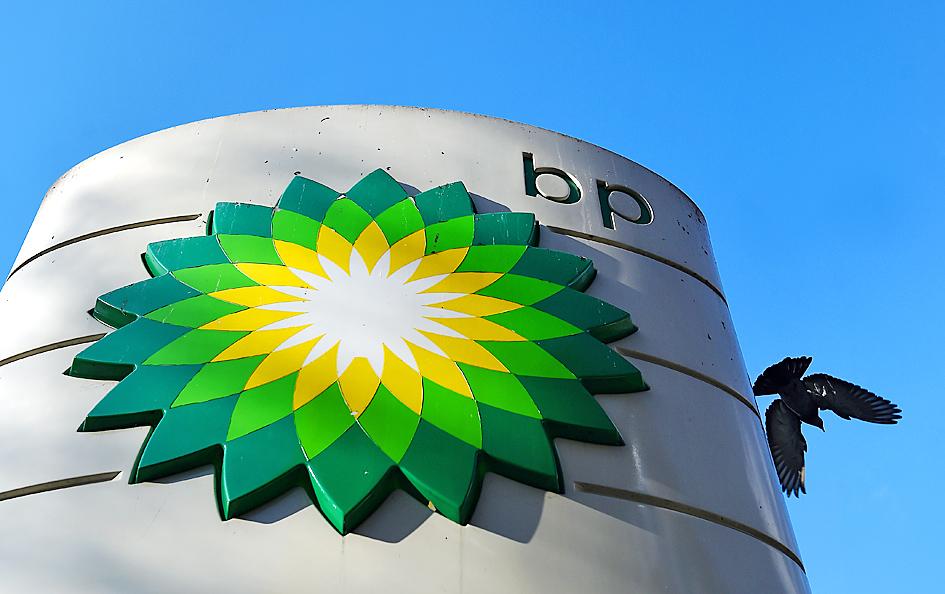BP PLC’s earnings last quarter fell short of expectations as COVID-19 restrictions continued to hurt fuel sales and refining profit margins.
The Western world’s largest oil and gas producers were supposed to be sailing into earnings season with a tailwind from stronger commodity prices, but their results so far show the wounds of last year’s historic slump have not healed.
BP eked out a modest profit, but it was still just a fraction of typical pre-COVID-19 pandemic levels, while cashflow was down.

Photo: EPA-EFE
Chevron Corp, the only other major so far to post its results for the period, underscored the industry’s enduring woes with a surprise loss due to weak fuel demand.
“Road and air travel are down, as are oil demand, prices and margins,” BP chief executive officer Bernard Looney said in a statement yesterday.
“We expect much better days ahead for all of us in 2021,” Looney said.
BP’s fourth-quarter adjusted net income was US$115 million, down from US$2.57 billion a year earlier and only a slight improvement from the preceding three months.
The company fell short of the average analyst estimate of US$440 million.
Operating cash flow, excluding Gulf of Mexico spill payments, a key figure for investors, as it determines the sustainability of dividend payments and capital expenditure, was much weaker. It fell to US$2.4 billion in the period, down from US$5.4 billion in the third quarter last year.
Refining weighed down the company’s performance.
BP said that its refining business was affected “significantly” by lower volumes as a result of the pandemic, with continuing pressure on margins.
Gas marketing and trading were also weak.
One bright spot was net debt, which was down US$1.4 billion from the preceding quarter to US$39 billion at year-end.
Still, BP said that it expects the figure to increase in the first half of this year, driven by payments related to employee severance, the annual Gulf of Mexico oil spill compensation, and the completion of the offshore wind joint venture with Equinor ASA.
The ratio of net debt to equity was 31 percent.
“These results reflect a truly tough quarter,” BP chief financial officer Murray Auchincloss said.

Stephen Garrett, a 27-year-old graduate student, always thought he would study in China, but first the country’s restrictive COVID-19 policies made it nearly impossible and now he has other concerns. The cost is one deterrent, but Garrett is more worried about restrictions on academic freedom and the personal risk of being stranded in China. He is not alone. Only about 700 American students are studying at Chinese universities, down from a peak of nearly 25,000 a decade ago, while there are nearly 300,000 Chinese students at US schools. Some young Americans are discouraged from investing their time in China by what they see

MAJOR DROP: CEO Tim Cook, who is visiting Hanoi, pledged the firm was committed to Vietnam after its smartphone shipments declined 9.6% annually in the first quarter Apple Inc yesterday said it would increase spending on suppliers in Vietnam, a key production hub, as CEO Tim Cook arrived in the country for a two-day visit. The iPhone maker announced the news in a statement on its Web site, but gave no details of how much it would spend or where the money would go. Cook is expected to meet programmers, content creators and students during his visit, online newspaper VnExpress reported. The visit comes as US President Joe Biden’s administration seeks to ramp up Vietnam’s role in the global tech supply chain to reduce the US’ dependence on China. Images on

New apartments in Taiwan’s major cities are getting smaller, while old apartments are increasingly occupied by older people, many of whom live alone, government data showed. The phenomenon has to do with sharpening unaffordable property prices and an aging population, property brokers said. Apartments with one bedroom that are two years old or older have gained a noticeable presence in the nation’s six special municipalities as well as Hsinchu county and city in the past five years, Evertrust Rehouse Co (永慶房產集團) found, citing data from the government’s real-price transaction platform. In Taipei, apartments with one bedroom accounted for 19 percent of deals last

US CONSCULTANT: The US Department of Commerce’s Ursula Burns is a rarely seen US government consultant to be put forward to sit on the board, nominated as an independent director Taiwan Semiconductor Manufacturing Co (TSMC, 台積電), the world’s largest contract chipmaker, yesterday nominated 10 candidates for its new board of directors, including Ursula Burns from the US Department of Commerce. It is rare that TSMC has nominated a US government consultant to sit on its board. Burns was nominated as one of seven independent directors. She is vice chair of the department’s Advisory Council on Supply Chain Competitiveness. Burns is to stand for election at TSMC’s annual shareholders’ meeting on June 4 along with the rest of the candidates. TSMC chairman Mark Liu (劉德音) was not on the list after in December last